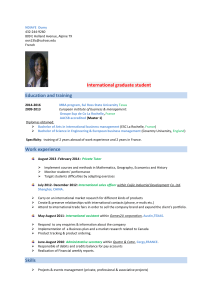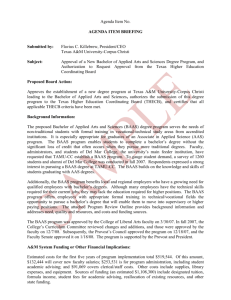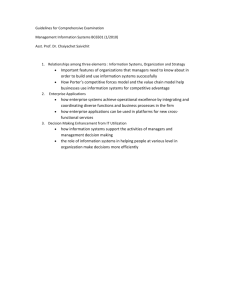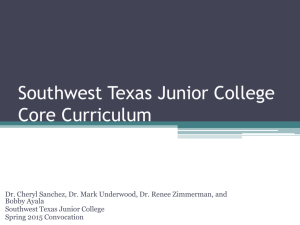A c a
advertisement
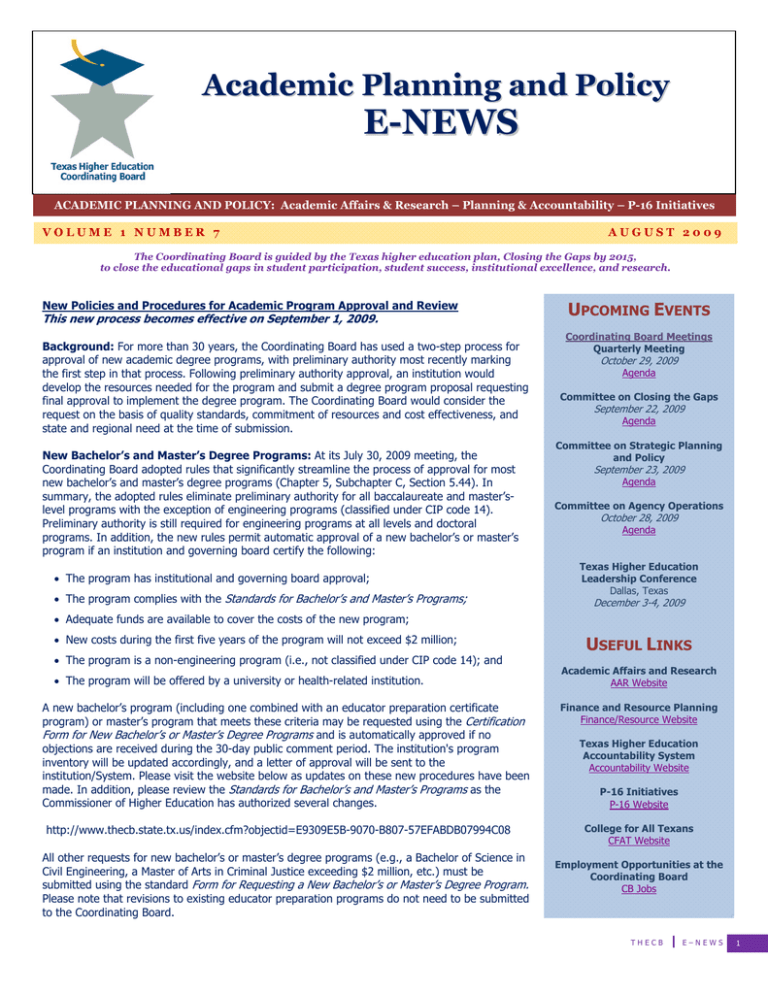
Academic Planning and Policy E-NEWS ACADEMIC PLANNING AND POLICY: Academic Affairs & Research – Planning & Accountability – P-16 Initiatives VOLUME 1 NUMBER 7 AUGUST 2009 The Coordinating Board is guided by the Texas higher education plan, Closing the Gaps by 2015, to close the educational gaps in student participation, student success, institutional excellence, and research. New Policies and Procedures for Academic Program Approval and Review This new process becomes effective on September 1, 2009. Background: For more than 30 years, the Coordinating Board has used a two-step process for approval of new academic degree programs, with preliminary authority most recently marking the first step in that process. Following preliminary authority approval, an institution would develop the resources needed for the program and submit a degree program proposal requesting final approval to implement the degree program. The Coordinating Board would consider the request on the basis of quality standards, commitment of resources and cost effectiveness, and state and regional need at the time of submission. New Bachelor’s and Master’s Degree Programs: At its July 30, 2009 meeting, the Coordinating Board adopted rules that significantly streamline the process of approval for most new bachelor’s and master’s degree programs (Chapter 5, Subchapter C, Section 5.44). In summary, the adopted rules eliminate preliminary authority for all baccalaureate and master’slevel programs with the exception of engineering programs (classified under CIP code 14). Preliminary authority is still required for engineering programs at all levels and doctoral programs. In addition, the new rules permit automatic approval of a new bachelor’s or master’s program if an institution and governing board certify the following: • The program has institutional and governing board approval; • The program complies with the Standards for Bachelor’s and Master’s Programs; UPCOMING EVENTS Coordinating Board Meetings Quarterly Meeting October 29, 2009 Agenda Committee on Closing the Gaps September 22, 2009 Agenda Committee on Strategic Planning and Policy September 23, 2009 Agenda Committee on Agency Operations October 28, 2009 Agenda Texas Higher Education Leadership Conference Dallas, Texas December 3-4, 2009 • Adequate funds are available to cover the costs of the new program; • New costs during the first five years of the program will not exceed $2 million; • The program is a non-engineering program (i.e., not classified under CIP code 14); and • The program will be offered by a university or health-related institution. A new bachelor’s program (including one combined with an educator preparation certificate program) or master’s program that meets these criteria may be requested using the Certification Form for New Bachelor’s or Master’s Degree Programs and is automatically approved if no objections are received during the 30-day public comment period. The institution's program inventory will be updated accordingly, and a letter of approval will be sent to the institution/System. Please visit the website below as updates on these new procedures have been made. In addition, please review the Standards for Bachelor’s and Master’s Programs as the Commissioner of Higher Education has authorized several changes. http://www.thecb.state.tx.us/index.cfm?objectid=E9309E5B-9070-B807-57EFABDB07994C08 All other requests for new bachelor’s or master’s degree programs (e.g., a Bachelor of Science in Civil Engineering, a Master of Arts in Criminal Justice exceeding $2 million, etc.) must be submitted using the standard Form for Requesting a New Bachelor’s or Master’s Degree Program. Please note that revisions to existing educator preparation programs do not need to be submitted to the Coordinating Board. USEFUL LINKS Academic Affairs and Research AAR Website Finance and Resource Planning Finance/Resource Website Texas Higher Education Accountability System Accountability Website P-16 Initiatives P-16 Website College for All Texans CFAT Website Employment Opportunities at the Coordinating Board CB Jobs THECB | E–NEWS 1 ACADEMIC PLANNING AND POLICY: Academic Affairs & Research – Planning & Accountability – P-16 Initiatives VOLUME 1 NUMBER 7 AUGUST 2009 Review of Existing Programs: The rules adopted by the Board also include a directive to staff “to develop a process for the periodic review of existing degree programs.” A review process will likely include both quantitative and qualitative measures of a program’s quality and effectiveness. The Undergraduate Education Advisory Committee has recently made recommendations on measures that could be used in a review of undergraduate programs. In the near future, the Graduate Education Advisory Committee will consider measures for use in a review of master’s programs. We will keep you updated as progress is made. Other Changes: New procedures for administrative change approval and certificate program approval have also been adopted by the Board. Information on these new procedures has also been posted at the website indicated above. MacGregor M. Stephenson, Assistant Commissioner, Academic Affairs and Research New Coordinating Board Standing Committees The Coordinating Board’s standing committees have been restructured to clarify the work of the Board and eliminate duplication and omission. Below is a summary of the key changes as well as the purpose and overview of areas of responsibilities for each committee. The Academic Excellence and Research Committee and the Participation and Success Committee have been combined into the new Committee on Closing the Gaps. The Committee on Closing the Gaps will approve programs, strategies, and discretional funding aimed at closing the gaps in participation, success, excellence, and research, and monitor and assess progress toward these goals. The Committee on Strategic Planning is now the Committee on Strategic Planning and Policy in order to emphasize that this committee will determine the strategic direction of the Coordinating Board and Texas higher education, as well as develop policy to support the strategic plan. This committee will also review and approve academic degree programs, new construction, renovations, and property acquisitions, institutional missions, and the Coordinating Board’s Legislative Appropriations Request. Financial aid will come under the oversight of the two new committees and the Committee on Agency Operations: • The administration of financial aid programs (e.g., allocations of financial aid dollars, including grants, loans, and special programs) will come under the Committee on Agency Operations, which provides fiscal oversight. • The development of financial aid policy (e.g., restructuring financial aid programs, such as the TEXAS Grant need plus merit policy) will come under the Committee on Strategic Planning and Policy. • The public awareness and outreach functions of financial aid will come under the Committee on Closing the Gaps. If you have questions regarding these changes, please contact Linda Battles at (512) 427-6205 or Linda.Battles@thecb.state.tx.us. Linda Battles, Associate Commissioner, Commissioner’s Office Proposed Coordinating Board Rules Below are summaries of changes to Coordinating Board rules that will be considered at the Texas Higher Education Coordinating Board meeting on October 29, 2009. Rules are provisional at this point and may change. For more information please contact Kevin Lemoine at kevin.lemoine@thecb.state.tx.us. • Chapter 4, Subchapter N, Sections 4.225–4.229 (required rule change as a result of House Bill 2504, 81st Texas Legislature, Regular Session,): All institutions (other than health-related) are to post information about every undergraduate class offered for credit on their websites: syllabus, faculty curricula vitae, assignments, reading lists, discussion and lecture topics, and a departmental budget report. Additional information to be posted on websites includes a listing of all available work-study opportunities, and the estimated cost of attending the institution as a full-time entering student. • Chapter 5, Subchapter G, Sections 5.120–5.122 (required rule change as a result of House Bill 51, 81st Texas Legislature, Regular Session): Each institution designated as a research university or emerging research university is to submit a strategic plan which will show how the institution will achieve or enhance its recognition as a research university, with updates included as part of the statutory four-year review. Vanessa Davis, Assistant Director of Academic Programs, Academic Affairs and Research THECB | E–NEWS 2 ACADEMIC PLANNING AND POLICY: Academic Affairs & Research – Planning & Accountability – P-16 Initiatives VOLUME 1 NUMBER 7 AUGUST 2009 Statewide Developmental Education Plan At the July 30 quarterly meeting, the Coordinating Board approved a long-range statewide plan to improve the effectiveness of developmental education in Texas. The plan focuses on four strategies: • Developmental Education Demonstration Projects — funding of demonstration projects that focus on broad systemic reform of developmental education at community colleges. • Professional Development — focusing on improving the preparedness of developmental educators. • Technical Assistance to Institutions— focusing on providing professional or management advice and training provided by state and national experts in developmental education and organizational development. • Program Excellence — focusing on obtaining national recognition for programs and services. This long-range plan will be executed with the help of the new doctoral program in developmental education at Texas State UniversitySan Marcos and the recently funded Developmental Education Initiative with the Gates Foundation. For more information about the Statewide Developmental Education Plan, please contact Dr. Judith Loredo at (512) 427-6545 or Judith.Loredo@thecb.state.tx.us. Judith Loredo, Assistant Commissioner, P-16 Initiatives Accountability Peer Group Meetings The Fiscal Years 2010 and 2011 series of Accountability Peer Group meetings will focus on learning outcomes assessment and valueadded measures. These topics were selected because of the high level of interest expressed in them by state officials and Coordinating Board members. The executive and legislative branches often ask for information on student learning, and value-added assessment is likely to be the subject of an interim legislative charge. Institutional representatives will be asked to provide input on the Coordinating Board’s draft General Education/Core Curriculum Assessment Practices Survey. Once the survey is finalized, the representatives will assist their institutions with completion of the survey. The results of these meetings will be beneficial to the Coordinating Board and institutions. Susan Brown, Assistant Commissioner, Planning and Accountability College and Career Readiness Regional Round-Ups The Coordinating Board staff is contracting with institutions of higher education across the state to plan, coordinate, and host 10 “Regional Round-Ups” in fall 2009. To further the work begun in fall 2008 in a first round of regional meetings, the College and Career Readiness Regional Round-Ups are expected to reach up to 2,000 secondary and postsecondary educators to increase their awareness of College and Career Readiness Standards (CCRS) implementation, recent legislative action, and CCRS implementation strategies and resources available from the Coordinating Board, the Texas Education Agency, and regional secondary-postsecondary partners. The following dates and locations are planned (contact email for each meeting is provided in parentheses): • • • • • • • • • September 18 in Amarillo, hosted by Amarillo College: Lou Ann Seabourn (seabourn-la@actx.edu) September 21 in Carthage, hosted by Panola College: Andrew Fisher (afisher@panola.edu) September 25 and 26 in Houston, hosted by the University of Houston: Jeannette Morales (JFMorales@Central.UH.EDU) Online registration: http://uh.edu/wtsc_apps/thecb-reg/ September 29 in Abilene, hosted by Cisco College: Amy Dodson (amy.dodson@cisco.edu) September 30 in Temple, hosted by Central Texas College: Gail Roderique (gail.roderique@ctcd.edu) October 23 in Edinburg, hosted by The University of Texas-Pan American: Ana Maria Rodriguez (melleal@utpa.edu) October 30 in Austin, hosted by Austin Community College: Gary Madsen (gmadsen@austincc.edu) November 2 in Dallas, hosted by Texas Woman’s University: Barbara Lerner (blerner@twu.edu) TBA in San Antonio, hosted by Education Service Center, Region 20: Ed Vara (ed.vara@esc20.net) Judith Loredo, Assistant Commissioner, P-16 Initiatives 2009 Texas Higher Education Leadership Conference On December 3-4, 2009, the Coordinating Board will host the 2009 Texas Higher Education Leadership Conference – Accelerating Closing the Gaps: Making Opportunity More Affordable for Texas and Texans at the Westin City Center Hotel (650 N. Pearl Street) in Dallas. The conference is designed to bring together regents, trustees, chancellors, presidents, and other public and higher education leaders to share information on topics of interest. In conjunction with the conference, the Coordinating Board will present the Third Annual State of Higher Education Luncheon/Ninth Annual Texas Higher Education Star Awards Ceremony. The keynote address will be given by Commissioner of Higher Education Raymund Paredes. For more information or to provide suggestions for topics and speakers, please contact Dr. David Gardner, Deputy Commissioner for Academic Planning and Policy, at (512) 427-6246 or David.Gardner@thecb.state.tx.us. Mary Smith, Assistant Deputy Commissioner, Academic Planning and Policy ______________________________________________________________________________________ Newsletter Contact: Mary E. Smith, Assistant Deputy Commissioner, at (512) 427.6213 or mary.smith@thecb.state.tx.us THECB | E–NEWS 3
